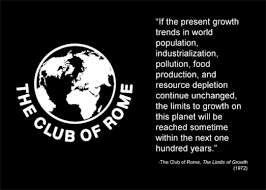Perhaps because The Guardian seems to be giving the piffle another run for its money:
The 1972 book Limits to Growth, which predicted our civilisation would probably collapse some time this century, has been criticised as doomsday fantasy since it was published. Back in 2002, self-styled environmental expert Bjorn Lomborg consigned it to the “dustbin of history”.
It doesn’t belong there. Research from the University of Melbourne has found the book’s forecasts are accurate, 40 years on. If we continue to track in line with the book’s scenario, expect the early stages of global collapse to start appearing soon.
Yeah, real soon now.
There's two very basic logical and or evidential flaws in the original study, ones that continue into the various updates that Graham Turner (a physicist, just the person you want to be pronouncing on things like resource availability, eh?) has spent the last few years turning out.
Firstly, they talk about the availability of minerals. And they manage to get this entirely wrong. They start by saying that mineral reserves are x. OK, that's cool enough. Then they compare reserves to annual usage, add a bit for growth in usage as the economy grows and that's fine enough too. They also (and here they're better than many that do this exercise) tell us that of course mineral reserves are not all that matters. There's mineral resources out there too, things we know about that we can convert to those reserves. All of this is fine so far.
Except they then assume (yes, this is a specific assumption they make, one they tell us they make) that mineral resources are ten times mineral reserves. So, if we've got mineral reserves of 30 years then we've got resources for 300: then we run out, civilisation collapses and AIEEE! We! All! Die!
This is complete and total piffle. There is absolutely no relationship whatsoever between reserves and resources. Running from memory here but mineral reserves of potassium are of the order of 60 years or so. Resources are 13,000 years' worth. Reserves of aluminium are around 30 years and resources will last us until the heat death of the universe. There are no reserves nor resources of tellurium anywhere on the planet. Yet we still manage to produce the 120 tonnes a year we use quite happily and can continue to do so for hundreds of thousands of years yet.
There simply is no connection at all between these two definitions of minerals available to us, not in the quantities that belong in each category.
Their misunderstanding gets worse too. It costs a lot of money to convert a resource (something we know where it is, what it's made of, that we can process it using current technology at current prices and make a profit doing so) into a reserve (exactly the same except that we have proven all of these points to certain technical and legal standards). There's a nickel mine out there that is currently producing large amounts of nickel. But it's not making a profit: so the ore that it is mining is still a resource, because it's not been proven yet that the new extraction method is profitable. It's just not a reserve yet even though it is producing. And it's taken $4 billion to get to this point too.
So, if converting a resource into a reserve costs these sorts of sums then people only do it when they're about to start actually mining it. Which means that reserves, for obvious economic reasons, tend at any one point to be some 20-50 years' worth of usage. Why spend $4 billion *proving* something now when you're not going to dig it up for half a century?
Now we can see the piffleness of their assumption. If, for economic reasons, reserves are only say 30 years' worth of minerals then assuming that resources are ten times reserves means that whenever and whatever else you do with your calculations then we run out of minerals in 300 years' time and AIEE! We! All! Die!
The basic assumption that the Club of Rome started with means that, inaccurately, the answer to Limits to Growth is always going to be that we run out of minerals in a couple of hundred years. It's simply not true and it's not true because one of their basic assumptions is piffle of the highest, almost Boris-like, pifflyness.
Turner then makes another hilariously piffly assumption. It's detailed here but essentially he says that we cannot substitute for fossil fuels. We'll not be able to use aluminium, or steel, or silicon, instead of coal and oil:
To account for substitutability between resources a simple and robust position has been taken. First, it is assumed here that metals and minerals will not substitute for bulk energy resources such as fossil fuels.
This is piffle of such magnitude that it ascends nonsense and rises to the level of argle bargle. Consider what is a windmill: it's the use of aluminium, rare earths, steel, concrete, as a substitute for fossil fuels. Solar cells are the substitution of silicon and gallium for fossil fuels. Tidal power is the substitution of concrete and turbines for fossil fuels.
In fact, all renewable energy technologies are the substitution of metals and minerals for fossil fuels.
So, he's telling us that we can't have energy because we can't use renewables and he's also telling us that we don't have enough minerals anyway. But both of these statements are wrong. No, not just mistaken, not arguably a bit extreme, not even well meaning errors. They're out and out fabrications stemming from the piffle nature of the original assumptions. Those two, entirely incorrect, assumptions make the Limits to Growth calculations always turn out this way. That in 300 years' time AIEE! We! All! Die!
Start again with the correct, non-piffle, assumptions, that we've plenty of minerals and we can use metals and minerals to substitute for fossil fuels and all the problems fade away. For if we have metals, minerals and energy then we don't all end up dying (AIEE! etc.) in 300 years' time from a lack of energy, metals and minerals, do we?
I've the notes around to do an entire book on this point but I've never actually bothered to sit down and scribble it out. Surely no one actually believes this piffle anyway so why bother refuting it? I might have to reconsider that.....















